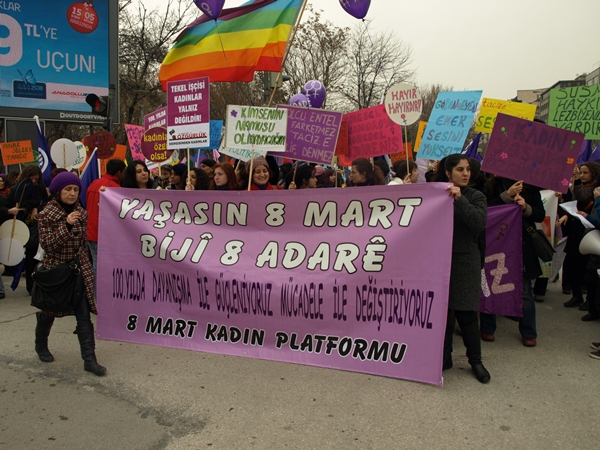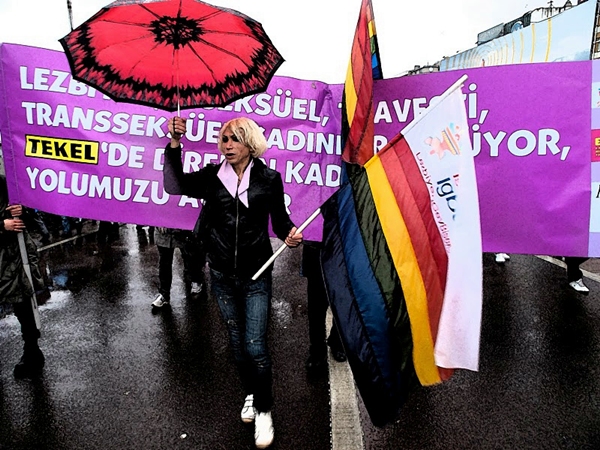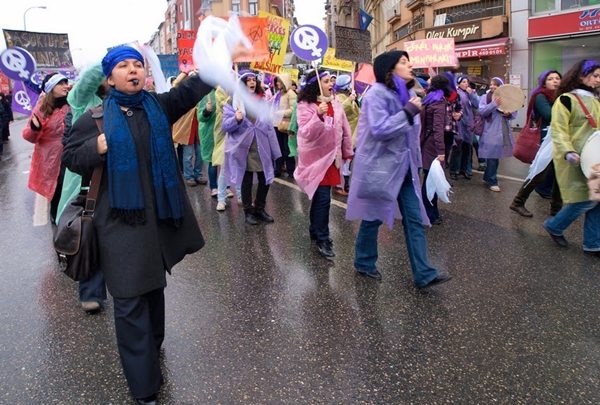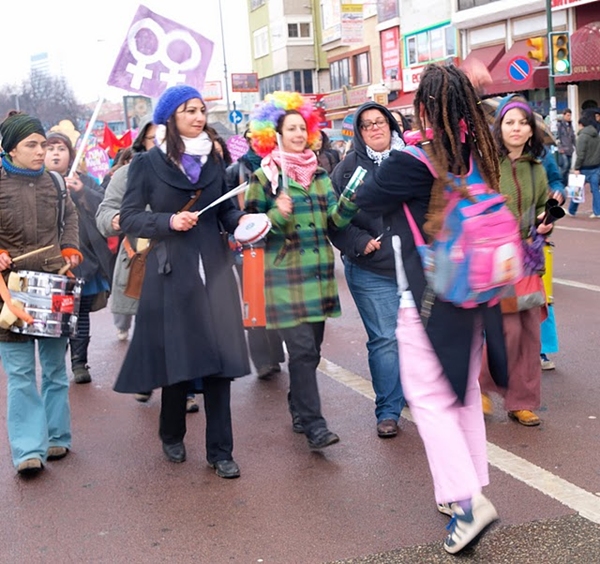Right before International Women’s Day, Turkish State Minister for Family and Women’s Affairs, Selma Aliye Kavaf, made controversial comments on morals and values in Turkey during her speech to a highly ranked national newspaper.
Arguing that homosexuality is a disease which can be treated, Kavaf continued with criticizing the political standing of some feminist NGOs in Turkey. She stated that violence against women is sometimes so exaggerated by certain NGOs that they perceive it as a form of psychological violence when a husband asks her wife for food. Finally, Kavaf expressed her irritation by some soap operas which have explicit kissing scenes.
These shocking comments magnetized several reactions from LGBT (lesbian, gay, bisexual, transgender) organizations, human rights organizations, artists, and many other intellectuals. One organization recently filed a criminal complaint against the minister. I argue that one of the most powerful responses was given to the minister during the demonstrations of Women’s Day in the cities of Ankara and Istanbul.

March 8 celebrations in Ankara. The banner says: — In the 100th anniversary of Women’s Day, we are getting stronger, changing with struggle. (photo: Eda Acara).
This year on the 8th of March, when Women’s Day was celebrated all over Turkey, a group of people attracted my attention as I was watching some videos captured during the celebrations. The group belonged to the Women’s Platform which unites different women’s initiatives and organizations. Instead of screaming out cliché slogans with fixed tone of voice, they use some sort of a humorous but politically critical way of protesting. For instance, a group of women within this platform sing one of the famous songs from the 1970s named “I born free, I live free” (hür doğdum, hür yaşarım) while jumping on the streets to the lyrics. So, there was this girl who covered herself with her rainbow flag, while singing loudly, arm in arm with a veiled woman:
Why does this liar world keep limiting me? Who the hell are you interfering with my life? I was born free, I live free, it is none of your business, I am not slave to you. My mistake, my life, it is none of their business, go do your own business, don’t interfere with my life.
Another scene that captured my attention was when a second group of people were all sitting on the street with their little hand-made drums (empty cans probably filled with lentil, rice, small stones) and whistles. One of them was standing and shouting “Make noise against heterosexism, make noise against fascism, make noise against capitalism.” Suddenly, everybody was shouting, whistling, playing those drums, right before they slowly stood up and shouted “Another world is possible”. It is quite fascinating to see the unity and solidarity of that group of women with diverse backgrounds.
Throughout this short essay, I will try to introduce the dynamics of the mainstream women’s movement in Turkey and argue that this women’s platform might be an indicator of a new epoch for this movement.
The Turkish Modernization Process: Making the Public Sphere Available for Women
First of all, I will give a brief summary of the Turkish Modernization process as many of the reforms concerning women were introduced during that period of time.
Since the establishment of the Republic in 1923, Turkey has gone through a process of westernization, secularization and nationalization; i.e., the components of what is often defined as the modernization project (Saktanber, 2002, p.20). Women were regarded as an important part of this whole process. As a part of the ‘secularization’ process, women were aimed to be freed from the constraints of religion and turned into citizens of the young republic. The Swiss Civil Code was adopted in 1926 and women’s suffrage was introduced in 1934 which can both be regarded as the major reforms (see additional sources under References below).
Adoption of The Swiss Civil Code guaranteed all Turkey’s citizens equal rights before the law, regardless of their language, religion, race and gender. The most important aspect was the ‘secularization’ of the legal system. In terms of women’s rights, the law guaranteed:
- Equality between men and women within family
- ‘Official’ state marriage as the only ‘legal’ marriage (religious marriage is not legally recognized in Turkey)
- Abolishment of polygamy
- Equality between men and women regarding the issues of divorce, marriage, inheritance and witnessing in trials
The civil code was revised and approved in 2001 and came into effect on January 1, 2002 (see further information.)
The rights that were given to women, however, have not contributed to a total freedom of women from traditional constraints. The young republic was initially an authoritarian and centralized regime which implicitly constrained the organization of any sort of civil society. Claiming that women had been provided full equal status with men and herewith did not need any specific organization, the government shut down the Turkish Women’s Union in 1935 (described in an article by Şirin Tekeli on Turkey’s Women’s Movement). It is possible to say that women were tried to be integrated into the public sphere where the boundaries were rigidly defined by the state. Accordingly, women were expected to appreciate the citizenship rights that were offered to them.
State-designated Image of the ‘Modern’ Woman in Turkey
The paradoxical operation of the modernization process in relation to the status of women can further be evaluated according to the state-designated image of women. The socio-political structure of the Ottoman Empire was very traditional and religion was an important part of the organization of everyday life. In this sense, talking about women’s citizenship rights and offering them access to the public sphere under the ‘modernization project’ was sensitive topics to be discussed during the early years of the republic. In other words, as Ayşe Saktanber describes in her book “Living Islam: Women, Religion and the Politicization of Culture in Turkey”, the politicians of the young republic had to negotiate the status of the ‘modern’ woman with a traditionally conservative society.
Secularism was the key motto and positioning of women within this motto was obviously a challenge. Here, the notion of ‘nationalism’ played a balancing role between modern and traditional. While Mustafa Kemal, the founder of the Turkish Republic and the commander of the Independence War, was proposing the reforms concerning women, he emphasized the heroic role played by women during the Independence War, underlying the fact that women share a significant part in the independence of the country and deserve equal rights with men (Parla, 2001, pp.71–75).
This image of the nationalist/patriotic woman was not traditional and backward-looking in terms of appearance and she would not stay at home but participate in the public sphere and serve the modernization of the nation. But at the same time she would be careful about her honour and chastity. In other words, the patriotic modern citizen identity limited the experience and the expression of a distinctive female sexuality, Parla explains. This can be seen as another type of boundaries set in front of women. It sounds like a precondition which offers women to enjoy the public domain but never forget the values and norms attached to her sexuality.
According to a report published by European Stability Initiative in 2007, Turkey has its first “woman revolution” during this modernization process because of the reforms mentioned above.
The report states that currently Turkey is going through its “second women’s revolution” since 2001 with the constitutional changes within the Civil and Penal Code. In order to understand this ‘second revolution’, we have to take a brief look at the development of the feminist movement in Turkey.
Organized feminism boosted after military coup
Undoubtedly, the voices of the 1968 generation were heard in Turkey as well and different groups of people were mobilizing parallel to the world wide identity movements in the 1970s. It was the Progressive Women’s Organization which was effective in vocalizing primarily the conditions of the working-class women in Turkey, according to Tekeli.
The organization and other new feminist initatives were sharply silenced when the military regime came into power on September 12, 1980. Around 650,000 people were detained, 230,000 people trialed, 50 executed, and 14,000 stripped of their Turkish citizenship. All political parties, unions and foundations were closed.
After the coup, the feminist movement gained a new perspective and acceleration. Nilufer Timisi and Meltem Gevrek, who were both part of that movement, define the main features of the 1980s as “Gaining strength” and “Consciousness Raising” in their article. The consciousness raising groups centered around neighborhoods constituted the very basics of an organized movement. Gevrek and Timisi talk about how women began to meet weekly at each other’s houses, and simply shared their daily experiences. The act of questioning the wider system took its root from questioning these local experiences. Finding commonalities between each other’s stories helped those groups of women accumulate the necessary knowledge and triggered their desire to see the wider picture.
This formation, however, was not unitary as it primarily followed the Kemalist tradition and turned the Muslim and veiled woman into the Other, seeing them as “backward” and “non-modern”, as Hilal Ozcetin argues in one of her works. The polarization between the secular and the religious left many women outside of the movement. However, the mainstream feminist movement managed to press the State to change the sexist patterns of the 1926 Civil Code which gave husbands the privileged position as the head of the household, and favored the man concerning property ownership during marriage and divorce (Tekeli, 2006, p.195).
Women’s legal rights improve, but discrimination persists
Lots of campaigns have been launched and The Civil Code was reformed during 2001. Accordingly, any sexual assault towards women is now taken into consideration under the code ‘Felonies against Individuals’ instead of ‘Felonies against Public Decency and Family Order’ as it was before. Besides, equal property ownership rights concerning divorce and marriage are legally ensured by the reforms. Yet, the latest governmental statistics shows that there is still a long way to go for women before they achieve equal status to men in Turkey.
In February 2010, the Prime Ministry Directorate General on the Status of Women (KSGM) published the most recent statistics on the labour and political participation of women in Turkey (pdf, in Turkish).
According to the report, the labour force participation of women has been decreasing during the last decade. In 1990, 34,1 percent of the total labour force was occupied by women, however, this number decreased to 26,9 percent during 2002, and to 24,5 percent in 2008. This number is very low as 43 per cent of the university students are female. Women’s political participation is relatively low in the country as there are only 50 women deputies in the Turkish Parliament which consists of 550 seats. KSGM’s report also comprises numbers about the physical violence against women. It is stated that 38 per cent of urban and 43 per cent of rural women are subjected to physical violence in Turkey.
Uniting the Diversity
The official statistics regarding women’s status in Turkey is quite superficial and overlook the diversity among women. This diversity has been kept obscure even within the feminist movement for a long time. Its agenda was so much occupied by the dominance of patriarchy that it did not pay enough consideration to the merging of patriarchy with the notions of nationalism, religion, and heterosexism.
What is new about this newly emerging feminist movement that we have seen on the streets of Ankara and Istanbul is the fact that they are able to unite different groups of women by erasing the ideological differences among them. In this sense, for me, they form the most subversive fist against patriarchy. This new group of people are able to see all the facets of patriarchy which constraints the lives of a Kurdish woman, secular woman, veiled woman and lesbian woman despite the differences in terms of the degree of that oppression. That does not mean that the differences among women are intended to be neglected, but a common ground is found to act as a whole. I am sure that those women’s initiatives, which form the bigger platform, do have a separate and autonomous agenda that they follow for their own struggle. They are, however, able to create one ‘multivocal’ body of action during mass demonstrations, like they did on the 8th of March.

A transsexual woman in the March 8 celebrations in Istanbul. The banner says: — Lesbian, Gay, Bisexual, Transvestite, Transsexual Women are walking in the path opened by the resisting TEKEL Workers. (Tekel is a former state enterprise in the tobacco and alcoholic beverage sector that closed down their factory and left many workers unemployed). (photo: engin(art))
It is possible to trace their unitary understanding in their slogans. They shouted “Smash sexual, national, class-based exploitation” and “The world would shake if women were free”. Undoubtedly, there are organizations who do not want to integrate a veiled woman into them. Some women’s organizations never let the lesbians talk, arguing that the homosexuals’ turn has not come yet. Hence, what I have written about this platform might sound a little bit utopian as many people prefer to look at this new emerging group as ‘dreamers’. For me, they are the forerunner of a new epoch. “Another world is not only possible, she is on her way. On a quiet day, I can hear her breathing” says Arundhati Roy describing the new social movements that unite many different groups against the destructive forces of globalization. Concerning the new feminist movement in Turkey, I would like to believe that another world is possible also.
References and further reading
Bildirici, F.(07.03.2010). Escinsellik Hastalık, Tedavil Edilmeli, Retrieved 08.03.2010, from http://www.hurriyet.com.tr/pazar/14031207.asp?gid=59
European Stability Initiative (2007). İkinci Kadın Devrimi: Feminizm, Islam ve Turkiye Demokrasisinin Olgunlasmasi.Retrieved 09.03.2010, from http://www.esiweb.org/pdf/esi_document_id_91.pdf
KSGM (2010). The Status of Women in Turkey. Retrieved 03.03.2010, from http://www.ksgm.gov.tr/Pdf/tr_de_kadinin_durumu_subat_2010.pdf
Nilüfer, T., & Meltem, G. (2002). 1980’ler Türkiyesi’nde Feminist Hareket: Ankara Cevresi In B. Aksu & G. Asena (Eds.), 90’larda Türkiye’de Feminizm. Istanbul: Iletisim.
Ozcetin, H. (2009). ‘Breaking the Silence’: The Religious Muslim Women’s Movement in Turkey. Journal of International Women’s Studies 11(1), 106–119.
Parla, A. (2001). The ‘Honor’ of the State: Virginity Examinations in Turkey. Feminist Studies 27(1), 65–89.
Saktanber, A. (2002). Living Islam: Women, Religion and the Politicization of Culture in Turkey. London: I.B.Tauris.
Tekeli, Şirin (2006). The Turkish Women’s Movement: A Brief History of Success. In Quaderns de la Mediterrània, n. 7, 2006. 193–197.
Several authors have analyzed Turkey’s modernization process. Here is a selection for further reading:
Abadan-Unat, N. (1978). The Modernization of Turkish Women Middle East Journal, 32(3), 291–306 (http://www.jstor.org/stable/4325769)
Ahmad, F. (1993). The making of modern Turkey: London : Routledge.
White, J. B. (2003). State Feminism, Modernization, and the Turkish Republican Woman NWSA Journal, 15(3), 145–159.(http://www.jstor.org/stable/4317014)


